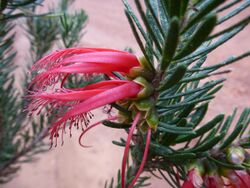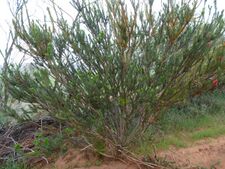Biology:Calothamnus quadrifidus subsp. asper
| Calothamnus quadrifidus subsp. asper | |
|---|---|

| |
| Calothamnus quadrifidus asper leaves and flowers | |
| Scientific classification | |
| Kingdom: | Plantae |
| Clade: | Tracheophytes |
| Clade: | Angiosperms |
| Clade: | Eudicots |
| Clade: | Rosids |
| Order: | Myrtales |
| Family: | Myrtaceae |
| Genus: | Calothamnus |
| Species: | |
| Subspecies: | C. q. subsp. asper
|
| Trinomial name | |
| Calothamnus quadrifidus subsp. asper (Turcz.) A.S.George & N.Gibson
| |
| Synonyms | |
|
Melaleuca quadrifida subsp. aspera (Turcz.) Craven & R.D.Edwards | |
Calothamnus quadrifidus subsp. asper is a plant in the myrtle family, Myrtaceae and is endemic to the south-west of Western Australia. It is similar to other subspecies of Calothamnus quadrifidus except that its leaves are short, flat and obviously rough and scaly when mature.
Description
Calothamnus quadrifidus subsp. asper is an erect shrub which sometimes grows to a height of 4 metres (10 ft) and lacks a lignotuber. Its leaves are flat, linear to narrow egg-shaped with the narrow end towards the base, 10–23 millimetres (0.4–0.9 in) long and 1–2 millimetres (0.04–0.08 in) wide. The leaves are also rough and scaly, with scattered hairs.[1]
The flowers are a deep red colour and are arranged in clusters, usually on one side of the stem amongst the older leaves. The stamens are arranged in 4 claw-like bundles, each about 23–28 millimetres (0.9–1 in) long. Flowering occurs from August to September and is followed by fruits which are woody, barrel-shaped capsules, 10–14 millimetres (0.4–0.6 in) long.[1]
Taxonomy and naming
Calothamnus quadrifidus subsp. asper was first formally described in 2010 by Alex George in Nuytsia.[2] It had originally been described in 1849 by Nikolai Turczaninow as Calothamnus asper.[1][3] The word (asper) is a Latin word meaning "rough", "harsh" or "uneven".[4]
Distribution and habitat
Calothamnus quadrifidus subsp. asper is found in the Wongan Hills district[1] of the Avon Wheatbelt biogeographic region.[5]
Conservation
Calothamnus quadrifidus subsp. asper is classified as "Priority Two" by the Western Australian Government Department of Parks and Wildlife[5] meaning that it is poorly known and from fewer than five locations.[6]
References
- ↑ 1.0 1.1 1.2 1.3 George, Alex S.; Gibson, Neil (2010). "A revision of Calothamnus quadrifidus (Myrtaceae)". Nuytsia 20: 70–72. https://florabase.dpaw.wa.gov.au/science/nuytsia/587.pdf. Retrieved 1 August 2015.
- ↑ "Calothamnus quadrifidus subsp. asper". APNI. https://biodiversity.org.au/boa/instance/apni/662575. Retrieved 2 August 2015.
- ↑ "Calothamnus asper". APNI. https://biodiversity.org.au/boa/instance/apni/526916. Retrieved 2 August 2015.
- ↑ Brown, Roland Wilbur (1956). The Composition of Scientific Words. Washington, D.C.: Smithsonian Institution Press. p. 669.
- ↑ 5.0 5.1 "Calothamnus quadrifidus subsp. asper". FloraBase. https://florabase.dpaw.wa.gov.au/browse/profile/35756. Retrieved 2 August 2015.
- ↑ "Conservation codes for Western Australian Flora and Fauna". Government of Western Australia Department of Parks and Wildlife. https://www.dpaw.wa.gov.au/images/documents/plants-animals/threatened-species/Listings/Conservation%20code%20definitions.pdf. Retrieved 16 July 2019.
Wikidata ☰ Q28813504 entry
 |



